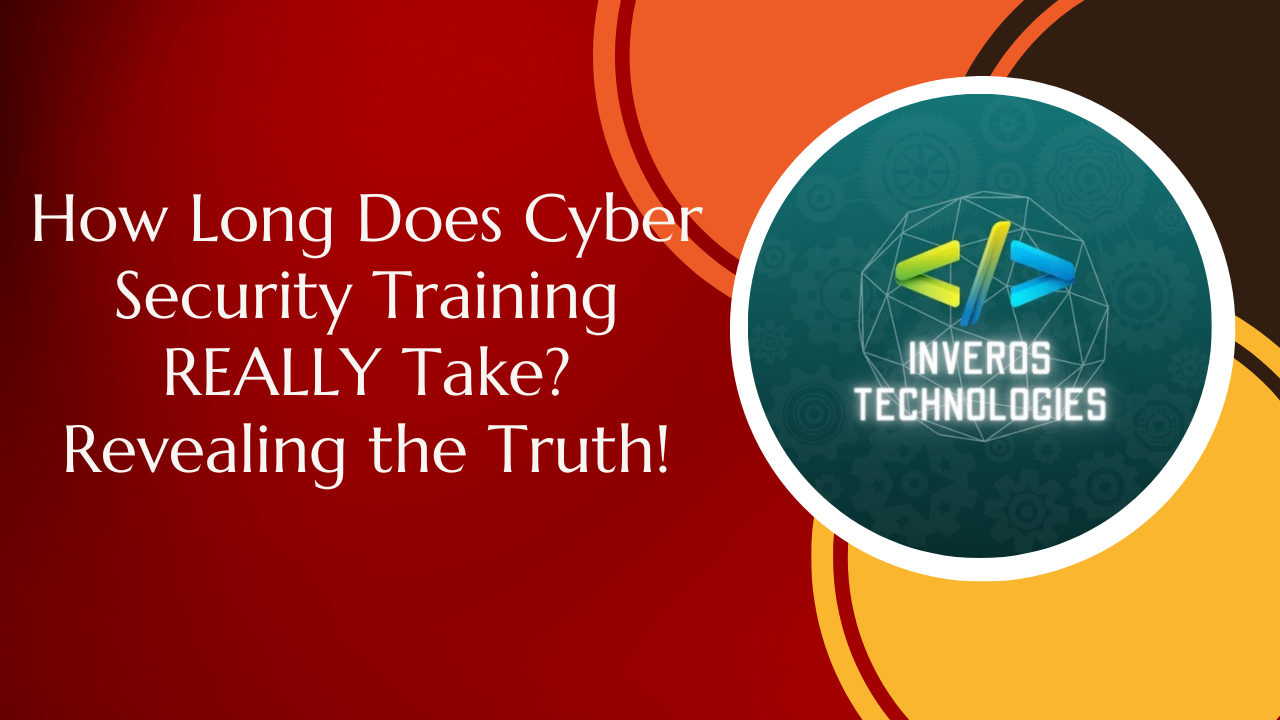Skip the generalized advice online. The truth is, cyber security training duration is a highly individual journey. It’s influenced by your starting point, the training format you choose, and even your personal learning style.
Let’s dive deeper into the factors that determine how long your cyber security training might take:

A Deeper Dive into Factors Affecting Cyber Security Training Duration
The duration of your cyber security training journey is highly individual, influenced by several key factors:
Your Starting Point:
Cybersecurity training is a personal journey. Whether you’re building a foundation, specializing, or upskilling, the duration is yours to define.
Beginner:
Building the Foundation: Beginners need a solid understanding of fundamental cybersecurity concepts like network security, operating systems, cryptography, and threat analysis. This often involves comprehensive courses or boot camps that cover a wide range of topics.
Popular Beginner Certifications: CompTIA Security+ is a widely recognized entry-level certification that validates foundational knowledge. Earning this certification typically takes 3-6 months of dedicated study, depending on your previous experience and learning pace.
Additional Resources: Beginner-friendly online courses, tutorials, and even books can be valuable resources for building a strong foundation. These can be completed at your own pace and often take several weeks to a few months to complete.
Intermediate:
Specialization and Skill Development: If you already have some cybersecurity knowledge, you can focus on specific areas of interest like penetration testing, incident response, or cloud security.
Online Courses and Bootcamps: Online platforms like Udemy, Coursera, and SANS Institute offer a vast array of intermediate-level courses and boot camps. These can be completed in 3-6 months depending on the complexity of the chosen area and your dedication.
Certification Options: Intermediate-level certifications like Certified Ethical Hacker (CEH) or Certified Information Systems Security Professional (CISSP) demonstrate deeper knowledge and specialization. These certifications often require 6-12 months of preparation, including hands-on experience and exam preparation resources.
Advanced:
Staying Up-to-date: As an expert professional, you might be looking to stay updated with the latest advancements in the field or pursue highly specialized certifications.
Focused Training and Certifications: Advanced boot camps, specialized online courses, and product-specific training can equip you with the latest skills and knowledge. These typically take 1-3 months to complete, depending on the program’s intensity and your prior expertise.
Continuous Learning: The cybersecurity environment is constantly growing, so ongoing learning through conferences, workshops, and self-directed study is crucial for keeping up with the times.
Training Format
Online Courses
Fit Training into Your Schedule: Online courses offer the convenience of learning from anywhere, anytime. You can choose from a variety of formats, including video lectures, interactive modules, and quizzes.
Cost-Effective: Online courses are generally more affordable than other training options, making them a popular choice for individuals and organizations.
Time Commitment: The duration of online courses varies greatly, ranging from short introductory courses that can be completed in a few weeks to comprehensive programs that take several months.
Bootcamps
Hands-On Training: Boot camps provide an in-depth and fast learning experience, often lasting several weeks to a few months.
Hands-on Focus: They emphasize practical skills development through labs, projects, and real-world scenarios, preparing you for immediate application of your knowledge.
Time Commitment: Bootcamps are designed for focused learning, requiring a significant time investment during the program duration.
In-Person Training:
Module-based learning: In-person training offers a structured learning environment with direct interaction with instructors and classmates.
Hands-on Labs: Many in-person programs include hands-on labs and workshops, providing valuable practical experience.
Time Commitment: The duration of in-person training programs can vary, ranging from a few weeks to several months, depending on the program’s intensity and content.
Certification Requirements
Exam Preparation: Different certifications have varying exam requirements and recommended preparation times. Researching the specific certification you’re aiming for will give you a clearer picture of the time commitment involved.
Study Resources: Many organizations offer official study guides, practice exams, and online resources to help you prepare for their certifications.
Hands-on Experience: Some certifications require documented hands-on experience in the relevant field, which can add to the overall training duration.
Remember, these are just general estimates. Your individual learning style, dedication, and chosen resources will ultimately influence your training duration.
Unlock Your Step-by-Step Guide to Become a Blockchain Developer in 2024
Beyond the Basics
While we’ve covered the core factors influencing cyber security training duration, let’s explore some additional aspects that can impact your learning journey in more detail:
Personal Learning Style:
Learning style is again subjective, varies from person to person.
Visual Learners:
Effective Learning Methods: Diagrams, charts, infographics, video demonstrations, and interactive simulations can significantly enhance their understanding.
Training Options:
Online courses with a strong visual component.
Platforms like Cybrary or INE, known for their engaging video lectures and labs.
Books and study guides with clear illustrations and diagrams.
Auditory Learners:
Effective Learning Methods: Lectures, podcasts, group discussions, and audio-based training materials can be highly beneficial.
Training Options:
In-person training with interactive lectures and discussions.
Online courses with audio recordings of lectures.
Podcasts like “Security Now” or “Risky Business” that delve into cybersecurity topics.
Action-Oriented Learners:
Effective Learning Methods: Hands-on labs, practical exercises, real-world simulations, and projects are important for strong knowledge and developing skills.
Training Options
Bootcamps with a strong emphasis on practical exercises and real-world scenarios.
Online courses with built-in labs and project opportunities.
Participating in Capture the Flag (CTF) competitions or bug bounty programs to apply skills in a simulated environment.
Hands-on Experience
Importance of Practical Application: Gaining hands-on experience through labs, projects, internships, and real-world simulations is invaluable in solidifying your knowledge and developing practical skills.
Benefits
Supporting theoretical concepts: Applying what you learn in a practical setting helps you understand the complexities of cyber security and how to apply your knowledge in real-world casess.
Develops problem-solving abilities: Troubleshooting challenges and guiding real-world security issues refine your critical thinking and problem-solving skills.
Enhances your resume: Hands-on experience can be a great advantage when looking for employment in the cyber security field, showing your ability to apply your knowledge in a practical setting.
Career Goals
Aligning Training with Career Path: Different cyber security roles may have different training requirements and expectations. Researching the specific career path you’re interested in will help you calculate the necessary training duration and areas of focus.
Specialization: Pursuing specialized areas within cyber security, like penetration testing or incident response, might involve additional training and certifications, extending the overall duration.
Continuous Learning: The cyber security landscape is constantly evolving. Regardless of your chosen path, ongoing learning through conferences, workshops, self-directed study, and staying updated with industry trends is crucial for staying ahead of the curve and maintaining your skills.
Remember, these are just additional considerations to keep in mind when planning your cyber security training journey. By understanding your individual learning style, prioritizing hands-on experience, and aligning your training with your career goals, you can optimize your learning path and achieve your desired outcomes.
You can also try reading this.. https://inverostechnologies.com/programming/how-to-become-a-web-developer-2024

Most Commonly Asked Questions
Cyber security training can feel overwhelming, with various paths, formats, and certifications. Let’s look at some of the most common questions to help you define your journey:
Q. How long does it take to get a cybersecurity certification?
The answer depends heavily on the chosen certification. Popular options like CompTIA Security+ can be achieved in 3-6 months, while advanced certifications like CISSP might require 6-12 months of dedicated study.
Q. What is the shortest cybersecurity training program?
Accelerated bootcamps can be completed in several weeks, offering a fast-paced immersion into the field. They are ideal for individuals seeking a quick and intensive learning experience.
Q. How long does it take to become a cybersecurity analyst?
The timeframe depends on your starting point, chosen training path, and any required experience. It could range from a few months for beginners to over a year for those transitioning from other IT roles.
Q. How long does it take to get a cybersecurity job?
Landing a job depends on various factors like your skills, experience, market demand, and job requirements. It could take weeks or even months to secure the right opportunity.
Q. How long does it take to learn cybersecurity on your own?
Self-study requires significant dedication and discipline. Depending on your chosen resources and learning pace, it could take several months to a year to gain a solid foundation.
Q. Is cybersecurity training worth it?
Absolutely! The demand for cybersecurity professionals is skyrocketing, with lucrative career opportunities and competitive salaries. Earning certifications and upskilling yourself can significantly enhance your employability and career prospects.
Q. What is the best cybersecurity training for beginners?
Beginner-friendly online courses, boot camps, and even books can provide a strong foundation. Look for resources specifically designed for those new to the field, focusing on fundamental concepts like network security, operating systems, and cryptography.
Q. How much does cybersecurity training cost?
The cost varies depending on the format, duration, and certifications involved. Online courses are generally more affordable, while bootcamps and in-person training can be more expensive.
Q. What are the different types of cybersecurity training?
Explore online courses, bootcamps, in-person training, and certification programs to find the format that best suits your learning style and goals. Each option offers unique advantages and can be combined for a comprehensive learning experience.
Q. What is the best way to learn cybersecurity?
Combine structured learning with practical experience through labs, projects, and even internships. Continuous self-development through conferences, workshops, and online resources is crucial in this ever-evolving field.
Remember, these are just general answers to common questions. It’s important to research specific programs and certifications to get a more accurate picture of the time commitment involved.
Conclusion

The cybersecurity landscape is constantly evolving, making continuous learning essential for staying ahead of the curve. Attending conferences, workshops, and engaging in self-directed study are crucial for maintaining your skills and knowledge base.
Here are some ways to stay updated:
Attend Industry Conferences and Events:
Networking with other professionals, learning about the latest trends, and participating in workshops can significantly enhance your knowledge and understanding.
Follow Cybersecurity Blogs and Publications:
Stay informed about current threats, vulnerabilities, and industry news by subscribing to reputable sources.
Engage in Online Communities and Forums:
Participating in online discussions and forums allows you to connect with other professionals, ask questions, and share your knowledge.
Take Advantage of Free Online Resources:
Numerous websites and platforms offer free articles, tutorials, and webinars on various cybersecurity topics.
Pursue Additional Certifications:
As your career progresses, consider pursuing advanced certifications to demonstrate your expertise and stay relevant in the ever-changing field.
Remember, continuous learning is a lifelong journey in cybersecurity. By actively seeking out new knowledge and staying engaged with the industry, you can ensure your skills remain sharp and relevant throughout your career.
Start Your Cybersecurity Journey Today

With the growing demand for cybersecurity professionals and the valuable skills you’ll gain, embarking on a cybersecurity training journey is an investment in your future. Start exploring your options, choose a path that aligns with your interests and goals, and take the first step towards an exciting and rewarding career.
Here are some resources to get you started:
- Online Course Platforms: Udemy, Coursera, Cybrary, INE
- Bootcamps: Hack Reactor, General Assembly, Launch Academy
- Certification Bodies: CompTIA, (ISC)², SANS Institute
- Industry Publications: Dark Reading, CSO Online, SecurityWeek
Remember, the key is to take action and start learning. Don’t get confused by the diversity of the field. Begin with the basics, explore different areas, and gradually build your knowledge and skills. The cybersecurity world is waiting for you!




Pingback: Is This Adorable Meme Coin, Hamster Kombat a Total Scam?